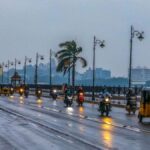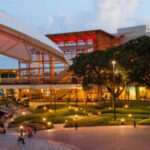Looking ahead, these days look like a period of chaos that can only be managed, not organized.
Before leaving home, assemble your outfit carefully. The Ikeja event cap is a blue fila. For the meeting of the Medical Society in Ajle, which is scheduled at the same time – 10 am, at the other end of town, the color is green. Your flowing white agbada will sit well with both.
At the Chapel of Christ the Light in Alausa, the Association of Retired Service Heads and Permanent Secretaries of Lagos State – ALARHOSPS – is holding a thanksgiving service to conclude its annual week of celebration and giving back to the society.
As you take your place on the front pew, you are struck by the sheer grandeur of the chapel's atmosphere.
You always feel a sense of awe sitting with the stalwarts of the Lagos Civil Service, some of whom served during the days of Alhaji Jakande. Older retirees talk about the various governors they have worked with – military and civilian, along with their passions and foibles. In some ways the situation in which the people of Lagos live today is a result of the thoughts and actions of some of these people. As time passes, there is an inexorable erosion process, and it imbues the camaraderie with a certain intensity, be it the brainstorming annual summit, the church or mosque Thanksgiving, or the biennial group birthday celebration where even the old and the stuffy relax and dance to disco music.
Church services are full of praise and worship. There is another group of celebrants at the service – Light Family Fellowship. They are celebrating their 15th anniversary.
You keep an eye on the clock all the time. By twelve noon, you reason, you should head to St. Peter's Church, Faji, for the celebration of the 37th anniversary of the Medical Society of the Anglican Diocese of Lagos, of which you are a member.
“After the sermon and thanksgiving at the altar, you take a side door into the sunlight and begin your tour of the island. It's almost one o'clock.”
Your Google Map is showing a short-cut to your destination via Anikantamo to Adenji Adele. It's crazy, but you decide to follow it. As you turn off the Third Mainland Bridge, you are faced with narrow streets. Some roads are flooded and impassable, a fact apparently lost on Google Maps. You, historian of the Pelevura, the Amazons who lived in these parts and moved the mountains, must confess that your familiarity with the streets navigated by the Pelevura, and still trodden by the dense population of the decaying inner city, is more literary than literal.
Eventually you'll emerge on Omiddun. Reaching its end, you head towards Campbell Street, and from there turn towards Azle Street.
Remembering to change your hat to a green one, you run into the building with an apology at the ready.
St Peter's Church, Faji is a heritage Yoruba church, and a case can be made for recognizing it as the most historically significant Anglican church 'for the masses' and the first purpose-built church in Nigeria. Its origins date back to the arrival of the first Christian sermon, preached in Lagos in 1852 by James White, an indigenous catechist from Badagry, whose missionary work was supported by Rev. Charles Golmer and Rev. Ajayi Crowther. Golmer spent a few weeks in a tent at Ebut Arrow with Patrick White before moving on to establish the Breadfruit Mission. This was a temporary residence while he built his main mission house at Ehin Igbeti – the site of the present cathedral. The missionaries decided that a church should be built in the densely populated Oko Faji to facilitate evangelization. Its foundation stone was laid in 1853. The church was moved to its present location on Azle Street in 1860.
You don't have to worry about delays – they take their time here; You say to yourself smiling, sliding into a pew.
The church service is just half over.
Soon you will be joining the Medical Society for rededication and prayer at the altar. The pastor is someone you know. You shake hands.
You all go to the back of the church and proceed for Thanksgiving.
Then the whole congregation joins you and the singing and dancing begin again.
This was the first Yoruba church, after all, you argue, enjoying the spirit.
The conversation that followed at the reception in the hall above focused on the need to provide accessible healthcare to the public.
A church clinic was opened in this church forty-seven years ago. This was the first church clinic in the whole of Lagos. Twelve years later, following the example of this Church, a medical commission was inaugurated for the entire diocese. Health care is provided to parishioners as well as people of other religions in the community.
The Centenary City project taking place in Ibeju-Lekki will include a hospital and a rehabilitation center for drug addicts as part of the Anglican Church's service to the society, an official announced.
It has often been criticized that religious bodies have generally not been actively involved in trying to solve the pressing problems of Nigerians. Health care and community support have become token. The lack of values, which makes Nigerians corrupt and untrustworthy in their daily lives, is not defined as an existential problem for religion.
The food at the reception is sumptuous Isale-eko fare.
As you are walking out, the speech is still going on.
One more stop – a house call with a patient on Victoria Island. This time, no hats except professional ones, and the agbada must be taken off.
It's already a Sunday to remember in a special way.










